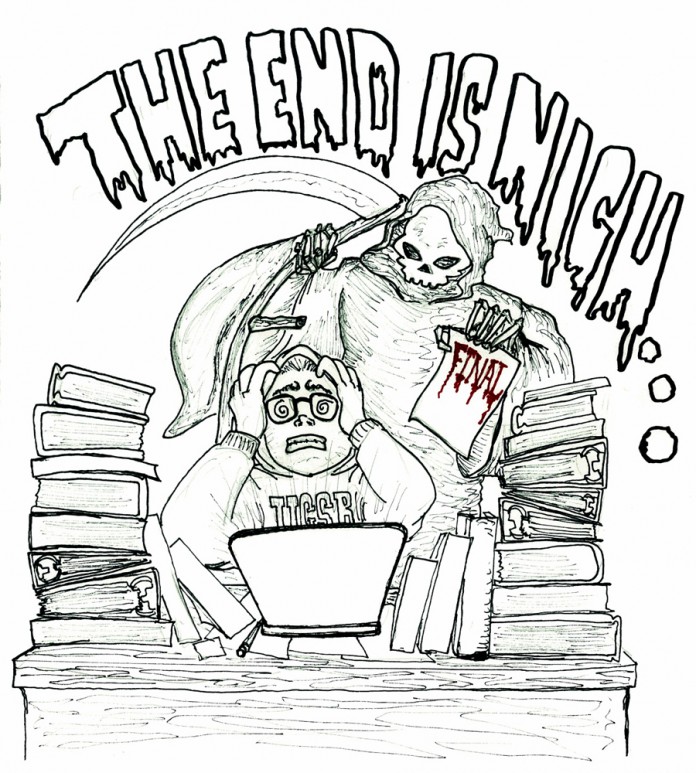Sam Goldman
Staff Writer
Illustration by Hector Lizarraga, Staff Illustrator
The concluding weeks of any quarter are marked by frantic finals preparation, coffee-fueled all-nighters meant to reach the page minimum on numerous papers, and stressing out over those random midterms that really should have been held three weeks earlier. During this terrifically stressful scramble to fulfill our classes’ requirements, it’s not uncommon for us students to wonder why we’re always too overloaded and overworked, and we sometimes struggle to reason out how it can all be worth it. Beyond classwork, we also have club activities and meetings, athletic practice and games, jobs and internships, and social and leisure commitments. What is the ultimate purpose behind overwhelming ourselves for four of what people call the best years of our life?
While it may seem unfair for professors to schedule all the crucial papers and exams for the end of the term, they do have good reason; we generally don’t have the requisite knowledge and learning until that point to actually write a good paper or test our understanding. This has the unintended effect, however, of making it that much more difficult to properly digest the material. We cannot retain all the information we’re given well when we are simultaneously struggling to meet so many separate word counts, not getting the chance to study until the night before, and sitting in impersonal, 600-person classes. When we’re so busy and stuck in a rather impersonal and often unengaging learning environment, our brains lack the time and proper stimulation for a more permanent absorption of the material. We’re being educated, but it won’t stick with us too long after we walk out of the final.
In our current higher education system, the only way to get that all-important degree in any kind of timely manner is to continually work our butts off. We all hear about how today’s bachelor’s degree is the equivalent of yesterday’s high school diploma, and it’s true–our degrees are in many respects our tickets to the job market. And what else increases our job prospects but club work, internships, community service, and our current minimum wage jobs–activities we cram into our already hefty schedules. Students are effectively forced more and more to pack non-academic activities into their time in order to remain competitive in the job market. This inevitably shifts our overarching focus in college to attaining a future job. It seems as if the point of college nowadays is to secure decent future employment, and the more impressive extracurricular activities we take on, the better our prospects become.
Unfortunately, this means that top-notch job preparation and a thorough traditional education have become somewhat incompatible; if we really want to excel in one, we have to at least partially sacrifice the other. Only changes to the structure of education and its financing can begin to bring the two goals together; making college affordable will free up time for studying that we now use to earn money, and developing more personal, engaging learning environments will allow us to better retain more knowledge. But because society as a whole dictates the expectations for college students who want to enter the job market, we will always have to take on extracurricular activities to remain competitive and inevitably be at least a little busy.
This shows in a way a fundamental shift in what society deems valuable in its up and coming members – from a specialized body of academic knowledge to a broad range of experiences and practical accomplishments. In many ways it is a reflection of the increasingly complicated and multifaceted status of modern society. We are expected to pay bills, operate bank accounts, work a job (or two), acquire car and health insurance, handle mortgages, and plan long trips. Beginning to learn how to juggle all these responsibilities is increasingly something we’re doing in college. One hundred years ago, life was still demanding, but much simpler in that higher education was an added bonus that was not crucial to managing life. But in today’s society, college is a vital institution for learning to juggle endless responsibilities, develop necessary practical experience, and above all, enhance our job prospects.











